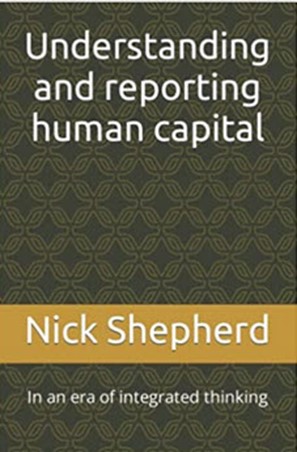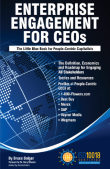New Book Aims to Help Organizations Understand and Report on Human Capital
This new book, Understanding and Reporting Human Capital, by a retired senior financial executive dedicated to human capital aims to provide a practical framework “that uses the input, activity, output, and outcome business model for integrated reporting and demonstrates how the model can be populated with relevant metrics, including emerging areas such as organizational culture.”

Nick. A. Shepherd is one of the first in the accounting professional to call for better management, measurement and reporting on human capital. A retired chief financial officer with extensive senior management experience, a Fellow of the Chartered Professional Accounts of Ontario, author of over a half-dozen publications on culture and human capital, he is one of a growing group in the financial profession recognizing the importance of addressing the current enormous gap in financial reporting: people. See
ESM: Have Accountants Lost Their Balance?
His new book suggests how to address the growing demand for new metrics that deal with people as a critical organizational resource, driven, he believes, by:

• “The growth of intangibles, including human capital as core drivers of value creation.
• The inadequacy of existing reporting approaches to disclose the important risks related to people, to users such as investors, regulators, and others.
• The changing attitudes in society to the quality of relationships between corporate entities and the people they employ and impact.”
Shepherd’s book provides an overview of existing metrics including ISO 30414 human capital reporting, the GRI, World Economic Forum and others. He explains what he feels to be their inadequacies and provides his own prescriptions. He suggests a model for metrics that starts to align with integrated reporting <IR> and embraces the role that people perform in sustainable organizational value and value creation. The book addresses critical emerging issues such as organizational culture and “entire system” performance.
Master the “S” of Environmental, Social, Governance (ESG), A.k.a. Stakeholder Capitalism
The Enterprise Engagement Alliance at
TheEEA.org is the world’s first and only organization that focuses on outreach, certification and training, and advisory services to help organizations achieve their goals by fostering the proactive involvement of all stakeholders. This includes customers, employees, distribution and supply chain partners, and communities, or anyone connected to an organization’s success.
Training and Thought Leadership
 Engagement Digital Media and Marketplaces
Engagement Digital Media and Marketplaces
Video Learning
 Books
Books
Enterprise Engagement Advisory Services
-
Organizations of all types develop strategic Stakeholder Capitalism and Enterprise Engagement processes and human capital management and reporting strategies; conduct human capital gap analyses; design and implement strategic human capital management and reporting plans that address DEI (Diversity, Equity, and Inclusion), and assist with managed outsourcing of engagement products and services.
-
Human resources, sales and marketing solution providers profit from the emerging discipline of human capital management and ROI of engagement through training and marketing services.
-
Investors make sense of human capital reporting by public companies.
-
Buyers and sellers of companies in the engagement space or business owners or buyers who seek to account for human capital in their mergers and acquistions.
For more information: Contact Bruce Bolger at
Bolger@TheICEE.org or call 914-591-7600, ext. 230.
 Nick. A. Shepherd is one of the first in the accounting professional to call for better management, measurement and reporting on human capital. A retired chief financial officer with extensive senior management experience, a Fellow of the Chartered Professional Accounts of Ontario, author of over a half-dozen publications on culture and human capital, he is one of a growing group in the financial profession recognizing the importance of addressing the current enormous gap in financial reporting: people. See ESM: Have Accountants Lost Their Balance?
Nick. A. Shepherd is one of the first in the accounting professional to call for better management, measurement and reporting on human capital. A retired chief financial officer with extensive senior management experience, a Fellow of the Chartered Professional Accounts of Ontario, author of over a half-dozen publications on culture and human capital, he is one of a growing group in the financial profession recognizing the importance of addressing the current enormous gap in financial reporting: people. See ESM: Have Accountants Lost Their Balance?
 ESM News Alert for the latest news. Subscribe here.
ESM News Alert for the latest news. Subscribe here.
